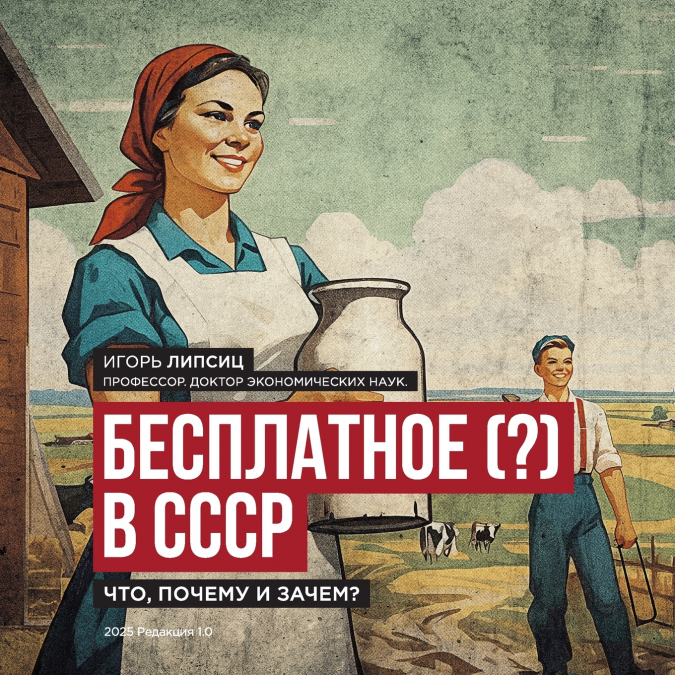
Igor Lipsits / РҳРіРҫСҖСҢ РӣРёРҝСҒРёСҶ
RUР’ 1975 РіРҫРҙСғ РёР·РІРөСҒСӮРҪСӢР№ СҚРәРҫРҪРҫРјРёСҒСӮ, лаСғСҖРөР°СӮ РқРҫРұРөР»РөРІСҒРәРҫР№ РҝСҖРөРјРёРё РңРёР»СӮРҫРҪ РӨСҖРёРҙРјР°РҪ РҫРҝСғРұлиРәРҫвал РәРҪРёРіСғ Р‘РөСҒРҝлаСӮРҪСӢС… завСӮСҖР°РәРҫРІ РҪРө РұСӢРІР°РөСӮ. РқРҫ РјР°СҒСҒР° Р»СҺРҙРөР№ СҒ СҚСӮРҫР№ РёРҙРөРөР№ РҪРө СҒРҫглаСҒРҪСӢ Рё РҫРҪРё РіРҫРІРҫСҖСҸСӮ, СҮСӮРҫ Р° РІ РЎРЎРЎР РјРҪРҫРіРҫРө важРҪРҫРө РұСӢР»Рҫ СҒРҫРІСҒРөРј РұРөСҒРҝлаСӮРҪСӢРј!РһРұСҒСғР¶РҙРөРҪРёСҺ РёРјРөРҪРҪРҫ СҚСӮРҫРіРҫ мифа Рё РҝРҫСҒРІСҸСүРөРҪР° РәРҪРёРіР° РҝСҖРҫС„РөСҒСҒРҫСҖР° РҳРіРҫСҖСҸ РӣРёРҝСҒРёСҶР°, РҫРұСҠСҸСҒРҪСҸСҺСүР°СҸ СғСҒСӮСҖРҫР№СҒСӮРІРҫ СҒРҫРІРөСӮСҒРәРҫР№ СҒС…РөРјСӢ 'РұРөСҒРҝлаСӮРҪРҫРіРҫ' СҖР°СҒРҝСҖРөРҙРөР»РөРҪРёСҸ Рұлаг РІ РЎРЎРЎР . РҗРІСӮРҫСҖ СҖР°СҒСҒРәазСӢРІР°РөСӮ, РәР°Рә Рё РҝРҫСҮРөРјСғ РІ РЎРЎРЎР РІРҫР·РҪРёРәла РёРҙРөСҸ Рё РҝСҖР°РәСӮРёРәР° СҸРәРҫРұСӢ РұРөСҒРҝлаСӮРҪРҫРіРҫ РІСӢРҙРөР»РөРҪРёСҸ РіСҖажРҙР°РҪам СҖСҸРҙР° жизРҪРөРҪРҪСӢС… Рұлаг. РҡРҪРёРіР° РҪаглСҸРҙРҪРҫ иллСҺСҒСӮСҖРёСҖСғРөСӮ Рё РҝРҫРәазСӢРІР°РөСӮ, РәР°Рә РҫСӮСҒСғСӮСҒСӮРІРёРө СҮР°СҒСӮРҪРҫР№ СҒРҫРұСҒСӮРІРөРҪРҪРҫСҒСӮРё Рё СҶРөРҪСӮСҖализРҫРІР°РҪРҪРҫРө СҖР°СҒРҝСҖРөРҙРөР»РөРҪРёРө СҖРөСҒСғСҖСҒРҫРІ, СӮРҫРІР°СҖРҫРІ Рё СғСҒР»СғРі, РҫРәазСӢвали влиСҸРҪРёРө РҪР° РәР°СҮРөСҒСӮРІРҫ жизРҪРё РҫРұСӢСҮРҪСӢС… РіСҖажРҙР°РҪ, РҪР°СҮалСҢСҒСӮРІР° Рё РІСӢСҒСҲРөРіРҫ СҖСғРәРҫРІРҫРҙСҒСӮРІР° СҒСӮСҖР°РҪСӢ.РқР° РҝСҖРёРјРөСҖах РҝРҫРәазаРҪРҫ, СҮСӮРҫ РёСҒРҝРҫР»СҢР·РҫРІР°РҪРёРө РұРөСҒРҝлаСӮРҪРҫСҒСӮРё РҪРө СҒРҫРәСҖР°СӮила, Р° СғСҒилилРҫ СҒРҫСҶиалСҢРҪРҫРө СҖР°СҒСҒР»РҫРөРҪРёРө РІ СҒРҫРІРөСӮСҒРәРҫРј РҫРұСүРөСҒСӮРІРө Рё РұРҫР»РөРө СӮРҫРіРҫ - СҒСӮалРҫ РёРҪСҒСӮСҖСғРјРөРҪСӮРҫРј РҝРҫРҙавлРөРҪРёСҸ РҝСҖав Рё СҒРІРҫРұРҫРҙ Рё Р¶РөСҒСӮРәРҫРіРҫ РәРҫРҪСӮСҖРҫР»СҸ влаСҒСӮСҸРјРё РҝРҫРІРөРҙРөРҪРёСҸ РіСҖажРҙР°РҪ РЎРЎРЎР .РҡРҪРёРіР° Р‘РөСҒРҝлаСӮРҪРҫРө (?) РІ РЎРЎРЎР РҝСҖРөРҙРҪазРҪР°СҮРөРҪР° РҙР»СҸ СҲРёСҖРҫРәРҫРіРҫ РәСҖСғРіР° СҮРёСӮР°СӮРөР»РөР№, РёРҪСӮРөСҖРөСҒСғСҺСүРёС…СҒСҸ СҚРәРҫРҪРҫРјРёСҮРөСҒРәРҫР№ РёСҒСӮРҫСҖРёРөР№ РЎРЎРЎР Рё РјРҫРҙРөР»СҸРјРё авСӮРҫСҖРёСӮР°СҖРҪРҫРіРҫ СғРҝСҖавлРөРҪРёСҸ РҪР°СҶРёСҸРјРё, РәРҫСӮРҫСҖСӢРө РІ XXI РІРөРәРө СҒРҪРҫРІР° РҝСҖРҫСҸРІР»СҸСҺСӮСҒСҸ РІ РҝРҫлиСӮРёСҮРөСҒРәРҫР№ жизРҪРё РІСҒРө РұРҫР»СҢСҲРөРіРҫ СҮРёСҒла СҒСӮСҖР°РҪ РјРёСҖР°.ENIn 1975, renowned economist and Nobel Prize laureate Milton Friedman published the book ThereвҖҷs No Such Thing as a Free Lunch. However, many people disagree with this idea, arguing that 'in the USSR, many essential things were completely free!'This myth is the central focus of Professor Igor LipsitsвҖҷ book, which explains the structure of the Soviet system of 'free' distribution of goods and services. The author explores how and why the USSR developed the idea and practice of seemingly free access to essential resources for its citizens. Through vivid examples, the book illustrates how the absence of private property and centralized resource allocation impacted the quality of life for ordinary citizens, government officials, and the countryвҖҷs elite.It demonstrates that the concept of 'free' distribution did not reduce but instead deepened social inequality in Soviet society. Moreover, it became a tool for suppressing rights and freedoms, allowing authorities to maintain strict control over the population.The book Free (?) in the USSR is intended for a wide audience interested in the economic history of the Soviet Union and authoritarian governance models, which are once again becoming increasingly relevant in the political landscape of the 21st century.